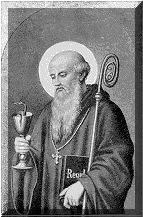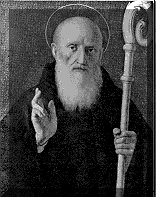 Saint Benedict of Nursia
Saint Benedict of Nursia Saint Benedict of Nursia
Saint Benedict of NursiaIn every changing period of history, God raises up great saints in order to strengthen the supernatural sway over souls exercised by the Church in virtue of her Divine mission. Thus, in the fifth century, when the Roman Empire had crumbled and the barbarians had invaded the whole of Europe, Benedict, God's chosen instrument in that era, appeared as patriarch of the monks of the West. He was born at Nursia, Umbria, Italy, in 480. Sent to Rome for higher studies when still a mere boy, but already endowed with the wisdom of age, he fled for the world to the solitude of Subiaco. After spending three years in a cave, in prayer and penitential exercises, he attracted many persons by his virtues and his prudent counsel.
In time Benedict was induced to leave his solitude
and assume the guidance of numerous disciples who gathered about him. The noble
families sent their sons to him and he soon founded twelve monasteries - " schools
for the Lord's service" - where, under the direction of an Abbot, the monks learned,
by the exercise of public and private prayer and of work, to forget self and live in God.
In the monastic Rule which he wrote for his disciples, St. Benedict combined prayer
and labor with heaven-inspired wisdom. This harmonious union of contemplative and
active forms of life characterizes the Benedictine life, as is expressed in the motto
which St. Benedict left to his disciples: ORA ET LABORA - " Pray and work."
On the 21st. of March, 547, having received a premonition of his death, St. Benedict had himself carried to the church. Despite his weakness, the venerable patriarch stood erect, for his body, long accustomed to rigorous discipline, was ever obedient to his resolute will. Supported by the arms of his sorrowing disciples, he received the Holy Viaticum with seraphic love. Then, in that holy place where he had so often basked in the sunshine of the Divine Presence, while yet a prayer of thanksgiving lingered on his lips, he gave back his soul to God. Thus was fittingly ended his life of devotedness to the service of God, and his glorious death has made him a patron of the dying.
The " Holy Rule," as the Councils called the Rule written by St. Benedict, " inspired by the same Spirit who dictated the sacred Canons," has sanctified thousands of souls who (especially during the six centuries when only the Order of St. Benedict existed in Europe), leaving everything to follow the example of the Patriarch of the West, have enrolled themselves in the " militia of Christ " under the Benedictine observance.
[HOME]
[OBLATES] [RULES] [DUTIES] [PRAYERS] [ORA] [LABORA] [SAINTS] [FAVORS] [REMARKS]
[ST. BENEDICT] [MEDAL] [INDULGENCES] [PURGATORY PRAYERS]
[HOLY WATER] [EXORCISM] [WEBSITES]
[VISITS TO THE BLESSED SACRAMENT]
[LITANIES]